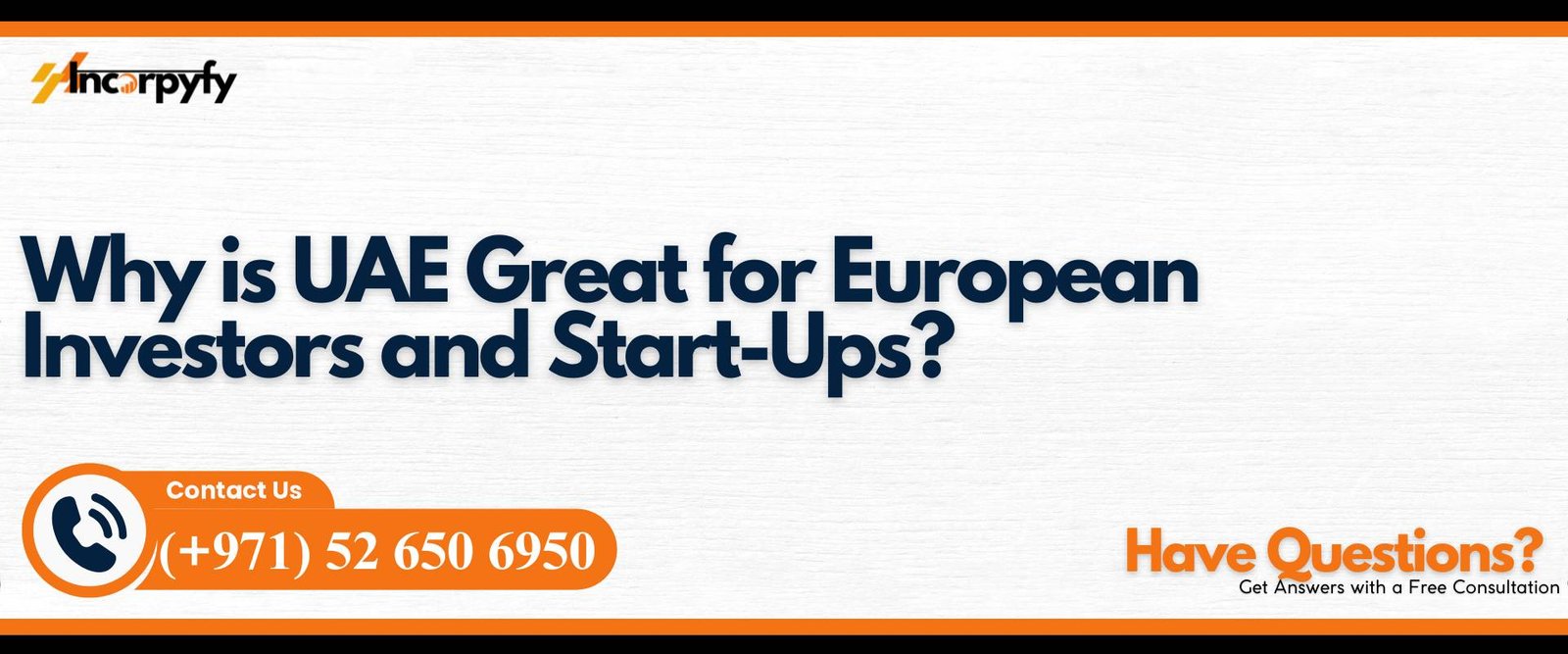
The United Arab Emirates (UAE) has emerged as a global powerhouse for foreign direct investment, attracting billions of dollars from around the world. For European investors and startups, the UAE presents an unmatched combination of strategic advantages, business-friendly policies, and growth opportunities that make it an ideal destination for expansion and investment.
The UAE’s allure as an investment haven demonstrates its resilience amid global uncertainties, and its strategic location between Europe, Asia, and Africa positions it as a natural gateway for European businesses looking to expand into emerging markets. With Dubai and Abu Dhabi leading the charge, the UAE offers European entrepreneurs and investors a unique blend of tax benefits, world-class infrastructure, and regulatory stability that’s hard to find elsewhere.
Strategic Location and Market Access
The UAE’s geographical advantage cannot be overstated for European businesses. Positioned at the crossroads of three continents, the country serves as a natural hub for companies looking to access Middle Eastern markets, Asian economies, and African opportunities from a single base.
Dubai International Airport is one of the world’s busiest international airports, offering direct flights to over 240 destinations worldwide, including major European cities. This connectivity means European executives can reach Dubai in just 6-7 hours, making it easier to manage operations and maintain business relationships.
The UAE’s time zone advantage also works in favor of European businesses. Located just 2-4 hours ahead of most European countries, the UAE allows for convenient business communication and real-time collaboration without the significant time delays experienced when working with Asian or American markets.
Moreover, the UAE serves as a gateway to emerging markets worth over $2 trillion in GDP, including the GCC region, South Asia, and parts of Africa. For European investors, this means access to high-growth markets with young demographics and increasing purchasing power.
Tax Benefits and Financial Incentives
One of the most compelling reasons European investors choose the UAE is its competitive tax structure. The UAE offers 0% corporate tax for qualifying free zone entities and a 9% rate for mainland businesses on profits above AED 375,000, which is significantly lower than most European countries where corporate tax rates range from 19% to 35%.
Free zones in the UAE offer particularly attractive benefits:
- 0% corporate tax for qualifying activities
- 100% foreign ownership allowed
- No personal income tax for residents
- Full repatriation of profits and capital
- Streamlined business setup procedures
The UAE’s corporate tax regime is amongst the most competitive globally, especially when compared to European markets where businesses face multiple layers of taxation. For European startups, this means significantly more capital available for growth and expansion rather than tax obligations.
The VAT system in the UAE is also favorable at just 5%, considerably lower than the 15-27% VAT rates common across Europe. This provides European businesses with cost advantages when operating in the UAE market.
Business-Friendly Regulatory Environment
The UAE has invested heavily in creating a regulatory framework that supports international business and entrepreneurship. The ease of doing business in the UAE ranks among the top globally, with streamlined processes for company formation, licensing, and regulatory compliance.
Key regulatory advantages include:
- Fast company registration (often completed within 2-3 days)
- Simplified licensing procedures across various sectors
- Strong intellectual property protection
- Efficient dispute resolution through specialized courts
- English-language business environment in most sectors
The UAE government has also introduced several digital initiatives to make business processes more efficient. The UAE Pass digital identity system and various e-government services allow European investors to handle most administrative tasks online, reducing bureaucracy and saving time.
Regulatory stability is another crucial factor. Unlike many emerging markets, the UAE maintains consistent policies and transparent regulations, giving European investors confidence in long-term planning and investment security.
World-Class Infrastructure and Connectivity
The UAE boasts infrastructure standards that rival or exceed those found in most European countries. From state-of-the-art airports and seaports to advanced telecommunications and modern business districts, the country provides everything European businesses need to operate efficiently.
Transportation infrastructure includes:
- World-class airports with extensive international connectivity
- Modern seaports handling millions of containers annually
- Advanced road networks and public transportation systems
- High-speed internet and 5G coverage across major cities
The logistics capabilities are particularly impressive, with Dubai serving as a major re-export hub for the region. European companies can leverage these logistics networks to efficiently distribute products across Middle Eastern, Asian, and African markets.
Commercial real estate in the UAE offers modern office spaces, industrial facilities, and warehouse complexes that meet international standards. Many business parks and free zones are specifically designed to attract international companies, with amenities like conference facilities, business centers, and on-site services.
Access to Skilled Workforce and Talent
The UAE attracts talented professionals from around the world, creating a diverse and skilled workforce that European companies can tap into. Over 200 nationalities work in the UAE, with many having international experience and language skills valuable for global businesses.
Key workforce advantages:
- Multilingual talent pool with English proficiency
- International experience among expatriate workers
- Growing local talent through education and training programs
- Competitive salary levels compared to major European cities
- Flexible employment regulations for international hiring
The UAE government has also launched initiatives to attract high-skilled workers and entrepreneurs, including long-term visas for investors, skilled professionals, and talented individuals. This makes it easier for European companies to bring in specialized talent or relocate key personnel to the UAE.
Growing Technology and Innovation Ecosystem
The UAE’s economic diversification plans have catalyzed growth across emerging sectors like e-commerce, cryptocurrency, and AI, making it an attractive destination for European tech startups and innovative companies.
The country has invested heavily in becoming a regional technology hub:
- Dubai Internet City and Abu Dhabi Global Market provide tech-focused free zones
- Government initiatives supporting artificial intelligence, blockchain, and fintech
- Venture capital funding availability for startups and scale-ups
- Innovation labs and accelerator programs for early-stage companies
Fintech regulations in the UAE are particularly progressive, with regulatory sandboxes allowing European fintech startups to test innovative products in a controlled environment. The UAE’s push toward becoming a cashless society and digital economy creates opportunities for European companies with digital solutions.
Market Opportunities and Consumer Base
The UAE market itself presents significant opportunities for European businesses. With a GDP per capita among the highest globally and a consumer base with strong purchasing power, the local market is attractive for premium European products and services.
Market characteristics include:
- High disposable income among residents
- Preference for quality and premium brands
- Multicultural consumer base with diverse preferences
- Growing e-commerce sector with increasing online adoption
- Tourism industry bringing millions of international visitors annually
The retail sector is particularly strong, with luxury shopping malls, e-commerce platforms, and distribution networks that European brands can leverage to enter the market efficiently.
Real Estate Investment Opportunities
European investors are discovering key trends in Dubai’s real estate market with opportunities for growth. The UAE’s real estate sector offers attractive investment opportunities for European investors looking for diversification and rental yields.
Real estate advantages:
- Freehold ownership rights for foreigners in designated areas
- Competitive rental yields compared to major European cities
- No property taxes on ownership or rental income
- Growing market driven by population growth and economic expansion
- Luxury developments and commercial projects with international standards
The Dubai 2040 Urban Master Plan and various mega-projects across the UAE provide long-term growth potential for real estate investments.
Cultural and Lifestyle Benefits
For European entrepreneurs and executives, the UAE offers a high quality of life that makes it attractive for relocation and long-term presence. The multicultural environment, international schools, healthcare facilities, and recreational opportunities rival those found in major European cities.
Lifestyle advantages include:
- Year-round sunshine and beach lifestyle
- International cuisine and cultural events
- Safe and secure environment with low crime rates
- Modern healthcare and education systems
- Tax-free personal income for residents
The UAE’s tolerance and diversity make it comfortable for European expats to live and work, with English widely spoken and international communities well-established.
Conclusion
The United Arab Emirates offers European investors and startups an unparalleled combination of strategic advantages that make it an ideal destination for business expansion and investment. From competitive tax benefits and world-class infrastructure to market access and regulatory stability, the UAE provides everything European businesses need to succeed in the Middle Eastern and broader international markets.
With the UAE’s continued resilience amid global uncertainties and strategic pursuit of trade agreements with major global players, the country is well-positioned to remain a top destination for European investment and entrepreneurship. Whether you’re a startup looking for growth capital and market access, or an established company seeking regional expansion, the UAE offers the platform and opportunities to achieve your business objectives.
For European investors and entrepreneurs considering the UAE, partnering with experienced Business Setup Consultants in Dubai, UAE can help navigate the setup process, regulatory requirements, and strategic decisions needed to maximize success in this dynamic market.
Frequently Asked Questions (FAQs)
What are the main tax benefits for European companies setting up in the UAE?
European companies can benefit from 0% corporate tax in qualifying free zones, 9% tax rate for mainland businesses (only on profits above AED 375,000), no personal income tax, 5% VAT (lower than most European countries), and full profit repatriation without restrictions.
How long does it take to set up a business in the UAE as a European investor?
Business setup in the UAE typically takes 2-5 working days for free zone companies and 5-10 working days for mainland companies, depending on the business activity and documentation requirements. This is significantly faster than most European jurisdictions.
Can European investors own 100% of their business in the UAE?
Yes, 100% foreign ownership is allowed in UAE free zones and most mainland business activities. Recent changes to UAE commercial laws have removed the requirement for local sponsors in many sectors.
What are the visa options for European investors and entrepreneurs?
The UAE offers several visa options including investor visas, entrepreneur visas, 10-year golden visas for significant investors, and employment visas for company executives. Investment thresholds vary by visa type and emirate.
Which UAE free zones are most popular among European businesses?
Popular free zones include Dubai International Financial Centre (DIFC) for financial services, Dubai Internet City for technology companies, Dubai Multi Commodities Centre (DMCC) for trading, and Abu Dhabi Global Market (ADGM) for financial and professional services.
What is the cost of living in the UAE compared to major European cities?
The cost of living varies by emirate and lifestyle, but generally housing costs are competitive with major European cities, while no personal income tax often results in higher disposable income. Utilities and dining can be more expensive, while fuel is significantly cheaper.
Are there any restrictions on the types of businesses European investors can start in the UAE?
Most business activities are open to foreign investors, though some sectors like oil and gas, banking, and telecommunications may have ownership restrictions or licensing requirements. Professional services, trading, manufacturing, and technology businesses generally have no restrictions.
How does the UAE’s banking system work for European businesses?
The UAE has a modern banking system with international banks and local institutions offering corporate banking services. Account opening requires proper documentation and due diligence, but most European businesses can access full banking services including trade finance and international transfers.
What support is available for European startups in the UAE?
The UAE offers various startup support programs including government initiatives, accelerators, incubators, venture capital funds, and networking organizations. Many free zones also provide startup packages with reduced fees and business support services.
How important is it to work with local business setup consultants?
Working with experienced business setup consultants is highly recommended as they provide expert guidance on regulatory requirements, optimal business structures, licensing procedures, and ongoing compliance. This ensures efficient setup and helps avoid common pitfalls in the UAE business environment.






